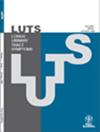Transient Receptor Potential Melastatin 8 Contributes to Cystitis-Induced Neuronal Sprouting and Pain Hypersensitivity Through AKT/mTOR Signaling Pathway in Interstitial Cystitis/Bladder Pain Syndrome
Abstract
Objectives
The aim of this study was to investigate the mechanism of TRPM8 in neuroproliferation and pain, as well as the relevance of the Akt/mTOR signaling pathway in mice with IC/BPS.
Methods
The model of IC/BPS was established in wild and TRPM8−/− mice. The mechanical sensitivity was measured. The number of neurite segments, length of neurites, and density of neurites were all counted. IL-6 and norepinephrine levels were detected by ELISA, Western blot was used to detect protein levels of TRPM8, Akt, p-Akt, mTOR, p-mTOR. Immunofluorescence was used to detect TRPM8 expression and distribution in neurites, neurons, and sensory nerves in mouse bladder tissue.
Results
Pain threshold in the IC/BPS group was decreased, and neurite segments, length, and density were all significantly enhanced when compared to the control group. The parameters in the IC/BPS model + Menthol group were more statistically significant. Neurite number and density were lower in TRPM8 knockout-model mice than in IC/BPS model mice. The expression of TRPM8 and the ratios of p-Akt/Akt and p-mTOR/mTOR rose in the IC/BPS model group. In TRPM8 knockout-model mice, the ratios of p-Akt/Akt and p-mTOR/mTOR were not substantially different from those in the control group. TRPM8 knockout-model mice had considerably lower levels of serum IL-6 and urine norepinephrine than IC/BPS model mice.
Conclusions
TRPM8 can induce pain hypersensitivity and sensory nerve proliferation by activating Akt/mTOR pathway and raising the expression of IL-6 and norepinephrine in IC/BPS models. These findings offer new perspectives on IC/BPS treatment.

 求助内容:
求助内容: 应助结果提醒方式:
应助结果提醒方式:


